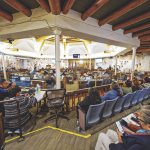
Masks now required in public
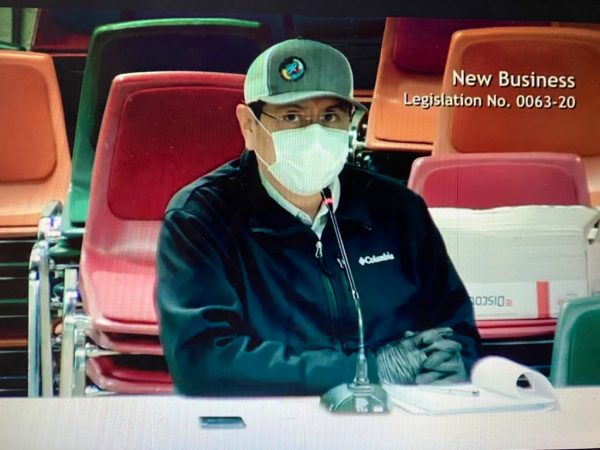
Navajo Times | Arlyssa Becenti
This still from a recent special Council session shows Navajo Nation President Jonathan Nez wearing a face mask and gloves. An order issued Friday requires everyone to wear a face mask in public on the Navajo Nation.
WINDOW ROCK
Farin Begay takes it upon himself to go out and get his parents supplies and when doing that, like an increasing number of Navajos, he makes sure to wear a face mask.
“I wear protective face masks to help slow the spread of Covid-19,” said Begay. “My parents are in their senior years and they rely on me for their resources, so I take all protective actions necessary to reduce the risk of infection.”
But not everybody is as conscientious as Begay, so Friday night the Navajo Department of Health issued Public Health Emergency Order 2020-007, requiring all individuals on the Navajo Nation to wear protective masks in public. It went into effect immediately.
Navajo President Jonathan Nez had warned viewers about the order during the most recent town hall meeting.
“I know someone is going to say ‘Well, where is our masks?’” said Nez. “Make one. You can cover your face with a handkerchief. You can put a shirt over your mouth and nose before you go into a store.”
The Public Health Emergency Order defines a mask as a covering designed to filter one’s breathing through both the nose and mouth. A mask must snugly cover the face around the nose and mouth to prevent the wearer from breathing unfiltered air. It may be a commercially made face mask, or a homemade cloth face covering.
“The global pandemic is affecting our local communities,” said Begay. “It is disheartening to know that there are individuals still not abiding by the preventative measures set by our leaders.”
In her profile picture for her Twitter account Crystal Cree is seen wearing a mask. She said encouraging masks is good, but the public should also be educated about keeping their masks clean.
“You can’t just lay (the mask) around,” said Cree. “You have to keep it clean and keep it separate from others. No sharing. We need more education on what type of masks are useful, i.e. 100 percent cotton, N-95.”
As a public service, the Navajo Times is making all coverage of the coronavirus pandemic fully available on its website. Please support the Times by subscribing.
How to protect yourself and others.
Why masks work. Which masks are best.
Resources for coronavirus assistance
Cree also said that masks and gloves are scarcely available even for hospitals on Navajo.
“The supply needs to be there to meet the demand,” said Cree. “If hospitals are struggling to get masks, how do you think the supply to the public is going to pan out?”
During a previous town hall meeting Nez challenged viewers to construct face masks and donate them. The instructions on how to sew the face masks can be found on the Centers for Disease Control website.
Kimberly Morgan said she doesn’t take any chances; her mask is on no matter what, even if she’s alone driving in her car to the Lowe’s grocery store in Burnside or just taking a walk outside.
“I wash my hands before I put the mask on and I don’t take it off until I wash my hands again,” said Morgan. “These little things I am doing are tedious but they could save my life. We all should be practicing this type of prevention.”
Friday night the total number of positive tests for COVID-19 had reached 1,127 with a total of 44 confirmed deaths on the Navajo Nation. For the first time, however, the number of new cases on Friday was slightly lower than the figure for the previous day, possibly indicating the curve is starting to flatten.
The Navajo Nation’s 57-hour weekend curfew began at 8 p.m. on Friday and will end Monday at 5 a.m. The Navajo Police Department will once again enforce the weekend curfew with road checkpoints. They will also issue citations for curfew violators, which may include up to $1,000 in fines and/or 30 days in jail.
“There are plenty of household tasks, hobbies, and other productive things we can do at home,” said Vice President Myron Lizer. “Let’s look at this in a positive light and spend time with our loved ones while using precautions and practicing social distancing as much as possible.”
This evening at 6 p.m. Nez and Lizer will host a live virtual town hall discussion with Arizona and New Mexico U.S. representatives Tom Udall, Deb Haaland, Tom O’Halleran, and Martha McSally, along with Arizona State Rep. Myron Tsosie and possibly other local leaders. It will be streamed via their Facebook Page, President Jonathan Nez and Vice President Myron Lizer.
The requirement for wearing a mask in public will remain in effect until ended by a subsequent Public Health Emergency Order.
Information: To learn more about masks and how to make and use them, visit cdc.gov. Information on donating masks and other items to the Navajo Nation COVID-19 Fund is at nndoh.org/donate.html.

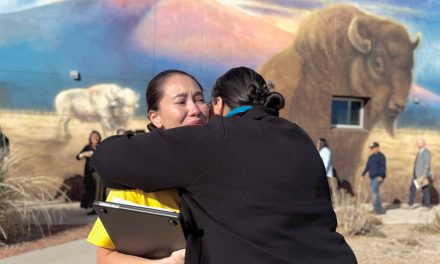
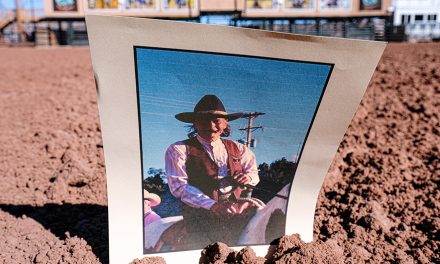

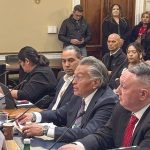



 Highway 264,
Highway 264, I-40, WB @ Winslow
I-40, WB @ Winslow